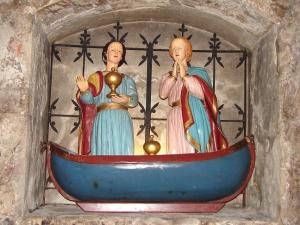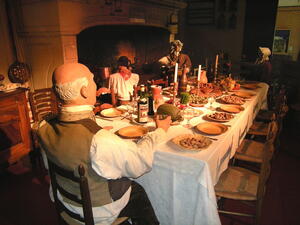A Christmas "supper" rife with symbols
According to a very ancient tradition, the closest companions of Jesus, persecuted by the Roman authorities, were set adrift in a small boat "with no rudder or sail," miraculously traversed the Mediterranean and landed in a desolate place south of Arles, in the marshlands of the Camargue.
Among the castaways were Mary Magdalene and her brother Lazarus, Mary Jacobe and Mary Salome—the "Holy Women" and the man who had risen from the Dead. From the place they had landed, soon to become the village of Les-Saintes-Maries-de-la-Mer, they started spreading the Gospel, making Provence the first region in Europe to be evangelized.
Two millennia later, Provence is no more "religious" than any of the other French provinces. But popular Christian rituals have remained strong, especially during the Christmas season. Their expression is often naïve and secular, but their roots reach deep into the oldest tradition and symbolism.
The Christmas Eve dinner, which is called "Gros Souper" (Big Supper), is at the heart of the Season's celebrations. It is a close family event where every course, and even the table setting, is rife with symbols. The table is dressed with three white tablecloths and is lit up by three candles, one for the Father, one for the Son, and one for the Holy Ghost. An empty seat awaits the poor who may knock on the door.
Seven courses, without fat, recall the "Seven Dolors" of the Virgin Mary, while 13 desserts symbolize Jesus and his 12 apostles. Three of these desserts, hazelnuts, raisins and almonds, are called "The Three Beggars"—their colour recalls the shade of the garment worn by the mendicant, or "begging orders."
But Christmas traditions have preserved something of pre-Christian times, when, at the Winter Solstice, one celebrated "Sol Invictus," the Undefeated Sun. Next to the family table, a fruit-tree log is burning in the fireplace, which the family head will sprinkle with a glass of wine, saying (in Provençal, of course): "To the coming year, and if we are not more, may we not be less!"
And this is a wish, whether we are Provençal or not, we can all share.



